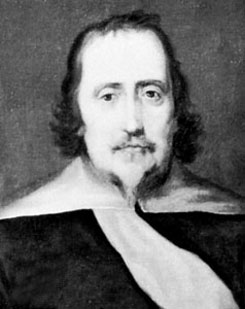| Ralph Hopton  Born: 1596 Born: 1596
Birthplace: Witham, Somerset, England
Died: Sep-1652
Location of death: Bruges, Belgium
Cause of death: unspecified
Gender: Male
Race or Ethnicity: White
Occupation: Military Nationality: England
Executive summary: Royalist commander, English Civil War Royalist commander in the English Civil War, was the son of Robert Hopton of Witham, Somerset. He appears to have been educated at Lincoln College, Oxford, and to have served in the army of the Elector Palatine in the early campaigns of the Thirty Years' War, and in 1624 he was lieutenant colonel of a regiment raised in England to serve in Mansfeld's army. Charles I, at his coronation, made Hopton a Knight of the Bath.
In the political troubles which preceded the outbreak of the Civil War, Hopton, as member of parliament successively for Bath, Somerset and Wells, at first opposed the royal policy, but after Strafford's attainder (for which he voted) he gradually became an ardent supporter of Charles, and at the beginning of the Great Rebellion he was made lieutenant general under the marquess of Hertford in the west.
His first achievement was the rallying of Cornwall to the royal cause, his next to carry the war from that county into Devonshire. In May 1643 he won the brilliant victory of Stratton, in June he overran Devonshire, and on the 5th of July he inflicted a severe defeat on Sir William Waller at Lansdown. In the last action he was severely wounded by the explosion of a powder-wagon and he was soon after shut up in Devizes by Waller, where he defended himself until relieved by the victory of Roundway Down on the 13th of July. He was soon afterwards created Baron Hopton of Stratton.
But his successes in the west were cut short by the defeat of Cheriton or Alrestord in March 1644. After this he served in the western campaign under Charles's own command, and towards the end of the war, after Lord Goring had left England, he succeeded to the command of the royal army, which his predecessor had allowed to waste away in indiscipline. It was no longer possible to stem the tide of the parliament's victory, and Hopton, defeated in his last stand at Torrington on the 16th of February 1646, surrendered to Fairfax. Subsequently he accompanied the prince of Wales in his attempts to prolong the war in the Scilly and Channel Islands. But his downright loyalty was incompatible with the spirit of concession and compromise which prevailed in the princes council in 1649-50, and he withdrew from active participation in the cause of royalism.
He died, still in exile, at Bruges in September 1652. The peerage became extinct at his death. The king, Prince Charles and the governing circle appreciated the merits of their faithful lieutenant less than did his enemies Waller and Fairfax, the former of whom wrote, "hostility itself cannot violate my friendship to your person", while the latter spoke of him as "one whom we honor and esteem above any other of your party."
Father: Robert Hopton
Mother: Jane Kemeys
Wife: Elizabeth Capel Lewin (m. 1623, d. 1646)
University: Lincoln College, Oxford University
UK Member of Parliament Bath, Somerset and Wells (1621, 1625, 1628, 1640)
Knighthood 1625
Inmate: Tower of London (Mar-1642)
Shrapnel Injury 6-Jul-1643
Paralyzed injured by ammunition explosion (6-Jul-1643), temporary
Exiled Bruges
Risk Factors: Blindness
Requires Flash 7+ and Javascript.
Do you know something we don't?
Submit a correction or make a comment about this profile
Copyright ©2019 Soylent Communications
|